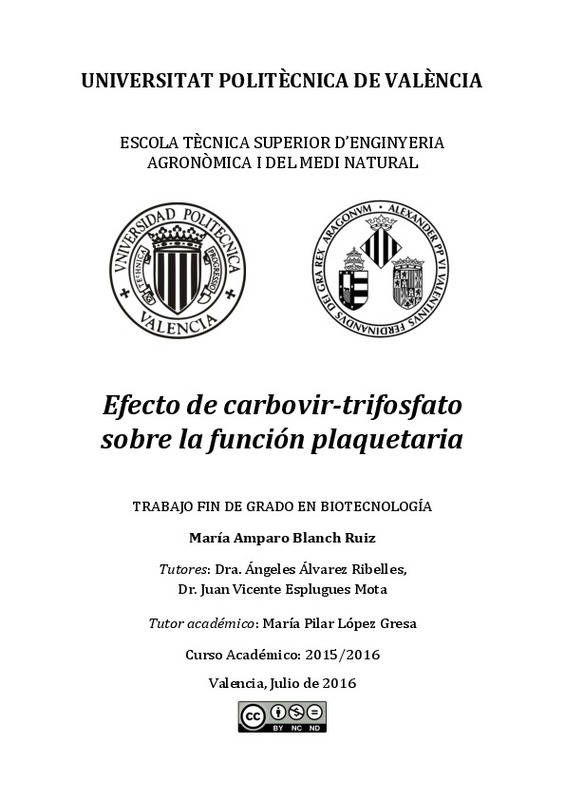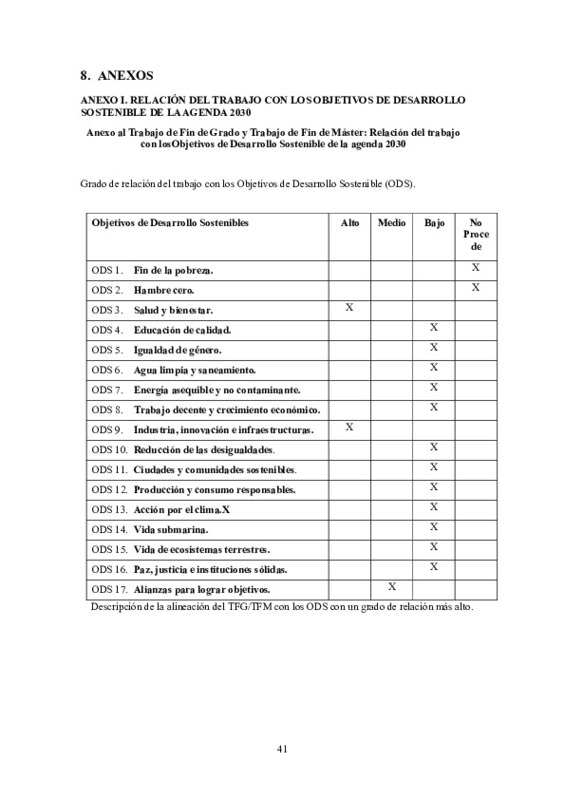JavaScript is disabled for your browser. Some features of this site may not work without it.
Buscar en RiuNet
Listar
Mi cuenta
Estadísticas
Ayuda RiuNet
Admin. UPV
Efecto de carbovir-trifosfato sobre la función plaquetaria
Mostrar el registro sencillo del ítem
Ficheros en el ítem
| dc.contributor.advisor | López Gresa, María Pilar
|
es_ES |
| dc.contributor.advisor | Álvarez Ribelles, Ángeles
|
es_ES |
| dc.contributor.advisor | Esplugues Mota, Juan Vicente
|
es_ES |
| dc.contributor.advisor | Álvarez Ribelles, Ángeles
|
es_ES |
| dc.contributor.advisor | Esplugues Mota, Juan Vicente
|
es_ES |
| dc.contributor.author | Blanch Ruiz, María Amparo
|
es_ES |
| dc.date.accessioned | 2016-09-05T11:25:21Z | |
| dc.date.available | 2016-09-05T11:25:21Z | |
| dc.date.created | 2016-07-19 | |
| dc.date.issued | 2016-09-05 | es_ES |
| dc.identifier.uri | http://hdl.handle.net/10251/68727 | |
| dc.description.abstract | [ES] Abacavir es un fármaco antirretroviral ampliamente utilizado en el tratamiento contra el SIDA. Se metaboliza en el citoplasma de las células para dar lugar a carbovir-trifosfato, su metabolito activo. Se ha observado que el uso de abacavir está asociado con la aparición de efectos adversos a nivel cardiovascular, en particular con un mayor riesgo de infarto de miocardio. Sin embargo, se desconoce si estos efectos están producidos por abacavir o por carbovir-trifosfato, ni cuales son los mecanismos responsables. La plaqueta tiene un papel fundamental en la patofisiología del infarto de miocardio, siendo una célula fundamental en el desarrollo del trombo que conduce a la isquemia e infarto. En este sentido, recientemente se ha demostrado que abacavir induce tanto interacción plaqueta-endotelio como interacción plaqueta-leucocito. Por tanto el objetivo del presente trabajo es analizar el efecto de carbovir-trifosfato en la función plaquetaria analizando su efecto sobre la agregación plaquetaria, la interacción plaqueta-leucocito, y la interacción plaqueta-endotelio. Esto nos permitirá dilucidar si los efectos de abacavir sobre la función plaquetaria son o no provocados por carbovir-trifosfato y ayudará a explicar el mecanismo por el cual abacavir puede producir toxicidad vascular. | es_ES |
| dc.description.abstract | [EN] Abacavir is an antiretroviral drug widely used in the treatment of AIDS. It is metabolized in the citoplasm of the cells to lead to carbovir-triphosphate, its active metabolite. Several studies have shown the association of abacavir with cardiovascular adverse effects, particularly with an increased risk of myocardial infarction. However, it is unknown whether these effects are caused by abacavir or by carbovir-triphosphate, neither the mechanisms involved. Platelet plays a major role in the pathophysiology of myocardial infarction, being important in the thrombus development leading to ischemia and infarction. In this regard, it has recently demonstrated that abacavir induces both platelet-endothelium and plateletleukocyte interactions, but doesn’t induce platelet activation. Therefore the aim of this study was to analyze the effects of carbovir-triphosphate on platelet function by characterizing its effect on: • platelet-endothelium interaction: employing a flow chamber that reproduces the flow shear rate present on the vessel wall, • platelet-leukocyte interaction: using flow cytometry that will differentiate leukocyte subpopulations and will analyze by an specific antibody for platelets (CD41), the presence of platelets in each subpopulation, • platelet activation: measuring the expression of P-selectin in the population of platelets, by flow cytometry. This will allow us to determine whether the effects of abacavir on platelet function coul be induced or not by carbovir-triphosphate and will help to explain the mechanism by which abacavir would cause vascular toxicity. In the same way of abacavir, carbovir triphosphate induces platelet-endothelium and platelet-leukocyte interactions, and doesn´t induce an increase on P-selectin expression, so it doesn´t activate platelets. The only one difference between the effects of these two compounds is the cell type involved on platelet-endothelium interaction: in the case of the interaction induced by abacavir this compound is exerting an effect on endothelial cells whereas on the interaction induced by carbovir-triphosphate, this exerts an effect on both endothelial cells and platelets. | es_ES |
| dc.format.extent | 45 | es_ES |
| dc.language | Español | es_ES |
| dc.publisher | Universitat Politècnica de València | es_ES |
| dc.rights | Reconocimiento - No comercial - Sin obra derivada (by-nc-nd) | es_ES |
| dc.subject | Abacavir | es_ES |
| dc.subject | Carbovir-trifosfato | es_ES |
| dc.subject | Plaqueta | es_ES |
| dc.subject | Leucocito | es_ES |
| dc.subject | Endotelio | es_ES |
| dc.subject | Interacción plaqueta-plaqueta | es_ES |
| dc.subject | Interacción plaqueta-leucocito | es_ES |
| dc.subject | Interacción plaqueta-endotelio | es_ES |
| dc.subject | Carbovir-triphosphate | es_ES |
| dc.subject | Platelet | es_ES |
| dc.subject | Leukocyte | es_ES |
| dc.subject | Endothelium | es_ES |
| dc.subject | Plateletleukocyte interaction | es_ES |
| dc.subject | Platelet-endothelium interaction | es_ES |
| dc.subject.classification | BIOQUIMICA Y BIOLOGIA MOLECULAR | es_ES |
| dc.subject.other | Grado en Biotecnología-Grau en Biotecnologia | es_ES |
| dc.title | Efecto de carbovir-trifosfato sobre la función plaquetaria | es_ES |
| dc.type | Proyecto/Trabajo fin de carrera/grado | es_ES |
| dc.rights.accessRights | Abierto | es_ES |
| dc.contributor.affiliation | Universitat Politècnica de València. Escuela Técnica Superior de Ingeniería Agronómica y del Medio Natural - Escola Tècnica Superior d'Enginyeria Agronòmica i del Medi Natural | es_ES |
| dc.contributor.affiliation | Universitat Politècnica de València. Departamento de Biotecnología - Departament de Biotecnologia | es_ES |
| dc.description.bibliographicCitation | Blanch Ruiz, MA. (2016). Efecto de carbovir-trifosfato sobre la función plaquetaria. http://hdl.handle.net/10251/68727. | es_ES |
| dc.description.accrualMethod | TFGM | es_ES |
| dc.relation.pasarela | TFGM\47652 | es_ES |
Este ítem aparece en la(s) siguiente(s) colección(ones)
-
ETSIAMN - Trabajos académicos [3541]
Escuela Técnica Superior de Ingeniería Agronómica y del Medio Natural









